语法一般将来时will讲解与练习
一般将来时begoingto与will的解析和练习

练习4: 完形填空
The party (1) at 8 pm tomorrow. We (2) many things to prepare. First, we (3) some food and drinks. Then we (4) the furniture and (5) some music. We hope you can join us!
使用正确的动词和时间状语。
练习8: 用一般将来时回答问题
使用正确的动词形式描述将发生的事情。
一般将来时中的日常口语表达
常用短语
1. I am going to… (我打算… ) 2. She will probably… (她可能会… ) 3. He will most likely… (他很可能会… )
一般将来时 bgoingto 与 will 的解析和练习
一般将来时是英语中最常用的时态之一,它用来描述将要发生的事情或预测 未来。本文将讨论一般将来时的两种构成方式:be going to 和 will。我们将 解析它们的用法,区别,在多种情景中的应用,并提供丰富的练习来帮助你 熟练掌握这种时态。
一般将来时的概述
时间状语从句的使用方法
时间状语从句用于描述一种更具体的时间或日期,并且通常以连词“when”或 “while”开始。
其他表示未来的形式
除了一般将来时,还有许多其他描述未来的语法形式,如进行时将来时和完 成时将来时。
一般将来时中的动词时态
动词时态用于描述正在进行的动作,是否完成或是否在将来进行。未来进行时态,将来完成时态和现在 完成进行时态均用于将来某个时刻或动作的描述。
练习3: 改变句子的时态
练习1
改写下面的句子,用将来进行 时: "I will be studying English tomorrow."
专题13一般将来时(讲义与练习)中考英语一轮复习之语法
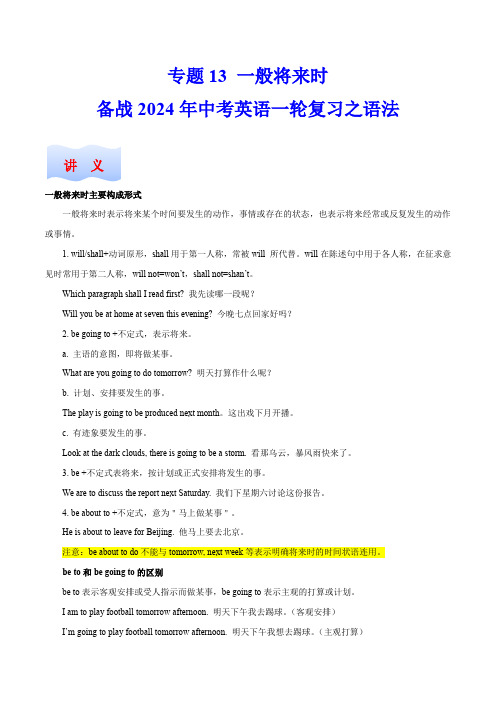
专题13 一般将来时备战2024年中考英语一轮复习之语法讲义一般将来时主要构成形式一般将来时表示将来某个时间要发生的动作,事情或存在的状态,也表示将来经常或反复发生的动作或事情。
1. will/shall+动词原形,shall用于第一人称,常被will 所代替。
will在陈述句中用于各人称,在征求意见时常用于第二人称,will not=won’t,shall not=shan’t。
Which paragraph shall I read first? 我先读哪一段呢?Will you be at home at seven this evening? 今晚七点回家好吗?2. be going to +不定式,表示将来。
a. 主语的意图,即将做某事。
What are you going to do tomorrow? 明天打算作什么呢?b. 计划、安排要发生的事。
The play is going to be produced next month。
这出戏下月开播。
c. 有迹象要发生的事。
Look at the dark clouds, there is going to be a storm. 看那乌云,暴风雨快来了。
3. be +不定式表将来,按计划或正式安排将发生的事。
We are to discuss the report next Saturday. 我们下星期六讨论这份报告。
4. be about to +不定式,意为"马上做某事"。
He is about to leave for Beijing. 他马上要去北京。
注意:be about to do不能与tomorrow, next week等表示明确将来时的时间状语连用。
be to和be going to的区别be to表示客观安排或受人指示而做某事,be going to表示主观的打算或计划。
I am to play football tomorrow afternoon. 明天下午我去踢球。
一般将来时be-going-to-与will解析和练习备课讲稿-2023年学习资料

四、there be句型的一般将来时-1.There is/are going to be-知:There is going to be a sports meeting at-our school next we k,-一般疑问式:-Is there going to be a sports meeting at-ou school next week?-回答:-Yes,there is./No,there isn't-否 句式:-There isn't going to be a sports meeting at-our s hool next week.
四、使用be going to应注意的两点-1.there be句型中going to后面的be不能改为ave-例如:-There is going to be a football match next-Sa urday in our school.-下周六我们学校将有一场足球比赛。e,go,leave arrive等表示位置移动的动-词常用现在进行时表示将要发生的动作,它-们很少与be going to结构 用。例如:-Miss Sun is coming tonight.-今晚孙小姐要来。
殷将来时的构成:-1.be going to+动词原-形-2.助动词W山+动词原形-动词原形包指动词be和 为动词原形
一、be going to的用法点拨-be going to是一种固定结构,后面接动词原-形,用来表示按计 或安排要发生的动作,-有时也可以表示推测将要或肯定会发生的-动作,有“准备;打算”的意思。含有be-goi g to结构的句子中往往有表示将来的时-间状语。例如:-We are going to have a cl ss meeting this-afternoon.-今天下午我们打算开班会。-Look at the b ack clouds.It's going to rain.-看那些乌云,快要下雨了。(推测
六年级英语一般将来时讲解加练习
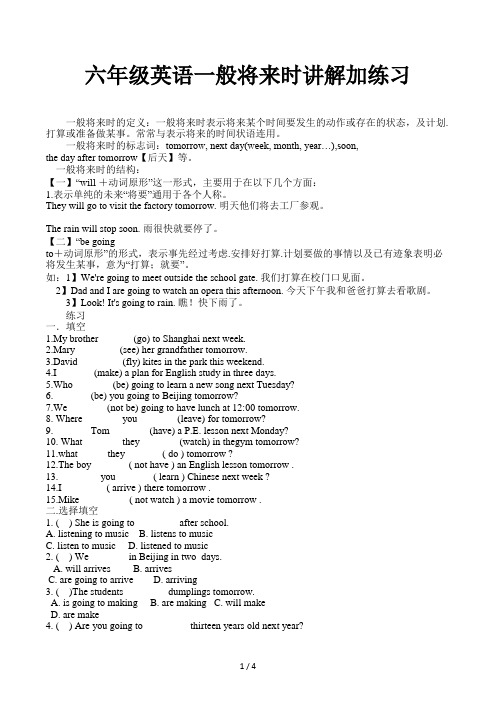
六年级英语一般将来时讲解加练习一般将来时的定义:一般将来时表示将来某个时间要发生的动作或存在的状态,及计划.打算或准备做某事。
常常与表示将来的时间状语连用。
一般将来时的标志词:tomorrow, next day(week, month, year…),soon,the day after tomorrow【后天】等。
一般将来时的结构:【一】“will +动词原形”这一形式,主要用于在以下几个方面:1.表示单纯的未来“将要”通用于各个人称。
They will go to visit the factory tomorrow. 明天他们将去工厂参观。
The rain will stop soon. 雨很快就要停了。
【二】“be goingto+动词原形”的形式,表示事先经过考虑.安排好打算.计划要做的事情以及已有迹象表明必将发生某事,意为“打算;就要”。
如:1】We're going to meet outside the school gate. 我们打算在校门口见面。
2】Dad and I are going to watch an opera this afternoon. 今天下午我和爸爸打算去看歌剧。
3】Look! It's going to rain. 瞧!快下雨了。
练习一.填空1.My brother ______ (go) to Shanghai next week.2.Mary ________ (see) her grandfather tomorrow.3.David ________ (fly) kites in the park this weekend.4.I_______ (make) a plan for English study in three days.5.Who _______ (be) going to learn a new song next Tuesday?6._______ (be) you going to Beijing tomorrow?7.We _______ (not be) going to have lunch at 12:00 tomorrow.8. Where _______ you _______ (leave) for tomorrow?9._______ Tom _______ (have) a P.E. lesson next Monday?10. What _______ they _______ (watch) in thegym tomorrow?11.what _____ they _______( do ) tomorrow ?12.The boy _______( not have ) an English lesson tomorrow .13.________ you _______( learn ) Chinese next week ?14.I ________ ( arrive ) there tomorrow .15.Mike _________ ( not watch ) a movie tomorrow .二.选择填空1. ( ) She is going to ________ after school.A. listening to musicB. listens to musicC. listen to musicD. listened to music2. ( ) We _______ in Beijing in two days.A. will arrivesB. arrivesC. are going to arriveD. arriving3. ( )The students ________ dumplings tomorrow.A. is going to makingB. are makingC. will makeD. are make4. ( ) Are you going to_________ thirteen years old next year?A. will beB. areC. beD. go5. ( ) ___will see a play in 5 days?A. WhenB. WhatC. WhoD. Whose6. ( ) Mary______ English next year.A. will learnB. will to learnC. are going to learn.D. learns7. ( ) He’ll _____ shopping this afternoon.A. goingB. goC. goesD. went8. ( ) Will you ____ at the bus stop at 10:30?A. meetingB. meetsC. meetD. met9. ( ) Lily and I _______ the guitar. next week.A. am going to playB. are going to playC. will playsD. play10. ( ) How ______ Jenny ___ home tomorrow?A. does......goB. is……goingC. will……goD. do……g o11. ( ) Who is going to _________ a song ?A. sings B singing C. to sing D. sing12. ( ) I _________in Beijing in three days.A. are going to arriveB. arriveC. will arriveD. arrives13. ( ) He _______some model planes tomorrow .A. going to makeB. is makingC. will make D makes14. ( ) Are you going to ___________a doctor next year ?A. will beB.. areC. beD. are going to15. ( ) She ________ you make supper this evening .A. helpsB. will helpC. is helpingD. is going help三.把下列句子变成一般疑问句,并给出肯定和否定回答。
初中英语主要时态系列——一般将来时讲解及练习【附中考真题及解析】
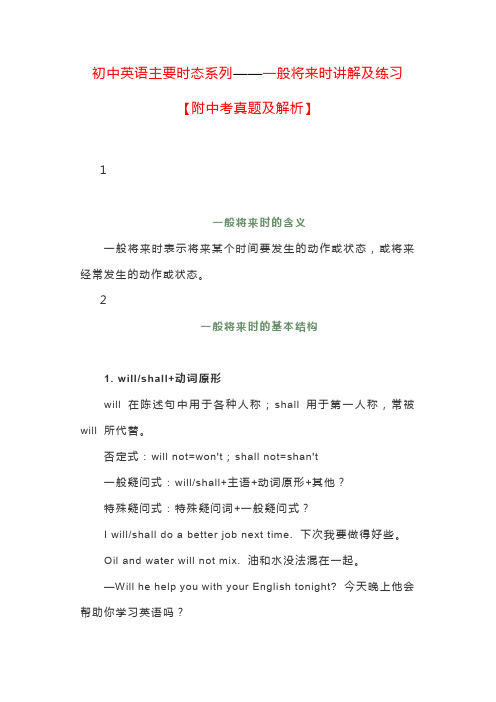
初中英语主要时态系列——一般将来时讲解及练习【附中考真题及解析】1一般将来时的含义一般将来时表示将来某个时间要发生的动作或状态,或将来经常发生的动作或状态。
2一般将来时的基本结构1. will/shall+动词原形will 在陈述句中用于各种人称;shall用于第一人称,常被will 所代替。
否定式:will not=won't;shall not=shan't一般疑问式:will/shall+主语+动词原形+其他?特殊疑问式:特殊疑问词+一般疑问式?I will/shall do a better job next time. 下次我要做得好些。
Oil and water will not mix. 油和水没法混在一起。
—Will he help you with your English tonight? 今天晚上他会帮助你学习英语吗?—Yes, he will./No, he won't. 是的,他会。
/不,他不会。
—When will you arrive for America? 你什么时候去美国?—Tomorrow. 明天。
2. am/is/are going to +动词原形否定式:am/is/are not going to +动词原形一般疑问式:am/is/are +主语+ going to + 动词原形+其他?特殊疑问式:特殊疑问词+一般疑问式?He is going to spend his holidays in London. 他打算在伦敦度假。
Look at the dark clouds. There is going to be a storm. 看那乌云,快要下雨了。
Is he going to collect any data for us? 他会帮我们收集数据吗?What are you going to do tomorrow? 明天你打算作什么?3一般将来时的用法will+动词原形与am/is/are going to +动词原形的用法虽然都表示将来发生动作或情况,一般情况下能互换。
初中英语语法一般将来进行时专项讲解及练习

初中英语语法一般将来进行时专项讲解及练习一、一般将来进行时的构成一般将来进行时是由“will be + 动词的ing形式”构成,表示将来某一时间正在进行的动作或事件。
具体构成如下:1. [肯定式]主语 + will be + 动词的ing形式例如:- I will be studying English at this time tomorrow.- They will be playing basketball next week.2. [否定式]主语 + will not be + 动词的ing形式(也可以使用缩写形式won't)例如:- She won't be sleeping when you arrive.- We will not be watching TV tonight.3. [疑问句]Will + 主语 + be + 动词的ing形式 + 其他?例如:- Will they be waiting for us at the station?- Will you be studying for the exam tomorrow?二、一般将来进行时的用法1. 表示将来某一时间正在进行的动作或事件,常常带有表示时间的状语。
例如:- She will be cooking dinner at 7 o'clock tomorrow.- They will be having a meeting this time next week.2. 表示对将来的推测或预测,常常带有表示将来的时间状语。
例如:- I think it will be raining tomorrow.- He will be studying hard for the exam next month.3. 与表示计划、安排的词语连用,表示预先安排好的将来动作。
例如:- We will be traveling to Paris next summer.三、一般将来进行时的练请根据句子的意思,用一般将来进行时进行填空。
一般将来时讲解及练习六年级

一般将来时标志词:tomorrow,thedayaftertomorrow,nextweek,intwoyears,soon,threedayslater等结构一:willwill可用于所有人称,shall只用于第一人称I和we肯定形式:主+willdo一般疑问:will+主+do否定形式:主+won’tdo特殊疑问:what/when/where/which+will+主+doeg:1.we knowtheresultsoon.我们很快就会知道结果了;2.we knowtheresultsoon.我们不会很快就知道结果的;3. we knowtheresultsoon.我们将会很快就知道结果吗4. weknowtheresult.我们将在什么时候知道结果结构二:begoingto肯定形式:主+begoingto+do一般疑问:be+主+goingto+do否定形式:主+benotgoingto+do特殊疑问:what/when等+be+主+goingto+doeg:skyisfullofblackclouds.Itto .快要下雨了;2.ButIthinkit rain.但我觉得它不会下雨;3.it soon很快就会下雨了吗4. you to tomorrow明天你要干什么小小区别:通常情况下will和begoingto能互换will,shall多习惯用于表示是否愿意,第一人称作主语的疑问句一般用shall不用willbegoingto则多用于表示根据迹象判断将要发生某事,或者计划打算要做的事eg:1.youdrivetoschooltomorrowwemeetat8:00tomorrowattheblackcloudsIt rain.readsomebookinthelibrarythisafternoon.用现在进行时bedoing表示将来时:go,come,leave,arrive等表示位置转移的动词eg:1.UncleWang come.王叔叔就要来了;2.They leaveforBeijing.他们即将前往北京;一般将来时练习一.连词成句并按要求改变句式注意动词的正确形式1、children,at,study,home,will,on,computer,inthefuture肯定陈述句:一般疑问句:2、back,they,month,later,a,get,will肯定陈述句:否定句:一般疑问句:3、he,is,going,a,to,patty,evening,this肯定陈述句:否定句:一般疑问句:特殊疑问句问时间:4. China is a modern and strong country.in twenty years5. Do you study hardfrom now on二、用括号中词的适当形式填空1、Thebus come.Pleasewaitforaminute.2、Guangzhou 将会morebueatifulYes,3、Howyou spentyouwinterholiday4、Peoplehavelessworktodointhefuture.5、we goouttomorrowifit rain三、选择正确的答案1. Thereanimportantmeetingnextweek.A.willbeB.willhaveC.willhasD.willgoingtobe2. toEnglandtomorrow.A.flyB.flewC.isflyingD.flies3. Marywillcomebackfiveo’ter4. yougototheparktomorrowA.WillB.ShallC.DoD.Are5. . The day after tomorrow they ________ a volleyball match.A. will watchingB. watchesC. is watchingD. is going to watch6. .There ________ a birthday party this Sunday.A. shall beB. will beC. shall going to beD. will going to be7. They ________ an English evening next Sunday.A. are havingB. are going to haveC. will havingD. is going to have8. ________ you ________ free next Sunday A. Will; areB. Will; be C. Do; be D. Are; be9. He ________ there at ten tomorrow morning. A. willB. Is C. will beD. be10. ________ your brother ________ a magazine from the libraryA. Are; going to borrowB. Is; going to borrowC. Will; borrowsD. Are; going to borrows作业:一、单项选择;1. There __________ a meeting tomorrow afternoon.A. will be going toB. will going to beC. is going to beD. will go to be2. Charlie ________ here next month.A. isn’t workingB. doesn’t workingC. isn’t going to workingD. won’t work3. He ________ very busy this week, he ________ free next week.A. will be; isB. is; isC. will be; will beD. is; will be4. There ________ a dolphin show in the zoo tomorrow evening.A. wasB. is going to haveC. will haveD. is going to be5.–________ you ________ free tomorrow – No. I ________ free the day after tomorrow.A. Are; going to; willB. Are; going to be; willC. Are; going to; will beD. Are; going to be; will be6. Mother ________ me a nice present on my next birthday.A. will givesB. will giveC. givesD. give7. – Shall I buy a cup of tea for you–________. 不,不要;A. No, you won’t.B. No, you aren’. No, please don’t.D. No, please.8. – Where is the morning paper – I ________ if for you at once.A. getB. am gettingC. to getD. will get二、动词填空;1. I ______leavein a minute. I ______finishall my work before I ______ leave.2. —How long _____ you _____studyin our country—I _____planto be here for about one more year.—What ______ you ______doafter you ______leavehere—I ______returnhome and ______geta job.3. I ______betired. I ______goto bed early tonight.4. Mary’s birthday is next Monday, her mother _____giveher a present.三、句型转换;1. People in the north often go skating in winter. next winter2. There are two cinemas in that town. next year3. He comes back late.in two days4.She is a conductor of a train.soon。
一般将来时讲解与练习
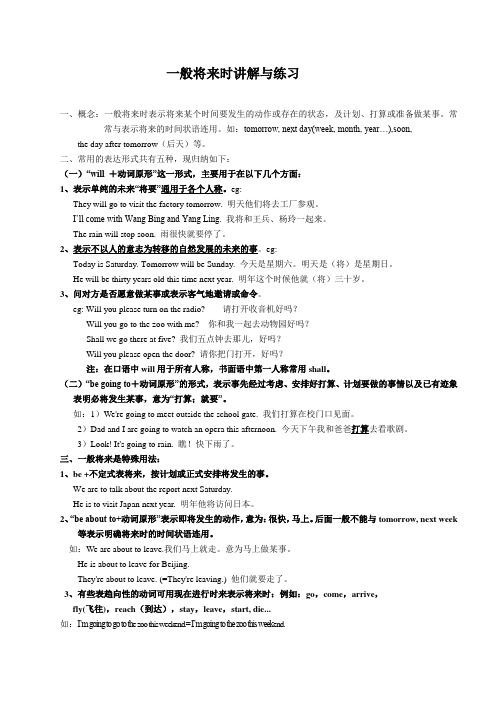
一般将来时讲解与练习一、概念:一般将来时表示将来某个时间要发生的动作或存在的状态,及计划、打算或准备做某事。
常常与表示将来的时间状语连用。
如:tomorrow, next day(week, month, year…),soon, the day after tomorrow(后天)等。
二、常用的表达形式共有五种,现归纳如下:(一)“will+动词原形”这一形式,主要用于在以下几个方面:1、表示单纯的未来“将要”通用于各个人称。
eg:They will go to visit the factory tomorrow. 明天他们将去工厂参观。
I’ll come with Wang Bing and Yang Ling. 我将和王兵、杨玲一起来。
The rain will stop soon. 雨很快就要停了。
2、表示不以人的意志为转移的自然发展的未来的事。
eg:Today is Saturday. Tomorrow will be Sunday. 今天是星期六。
明天是(将)是星期日。
He will be thirty years old this time next year. 明年这个时候他就(将)三十岁。
3、问对方是否愿意做某事或表示客气地邀请或命令。
eg: Will you please turn on the radio? 请打开收音机好吗?Will you go to the zoo with me? 你和我一起去动物园好吗?Shall we go there at five? 我们五点钟去那儿,好吗?Will you please open the door? 请你把门打开,好吗?注:在口语中will用于所有人称,书面语中第一人称常用shall。
(二)“be going to+动词原形”的形式,表示事先经过考虑、安排好打算、计划要做的事情以及已有迹象表明必将发生某事,意为“打算;就要”。
(完整)语法一般将来时will讲解与练习
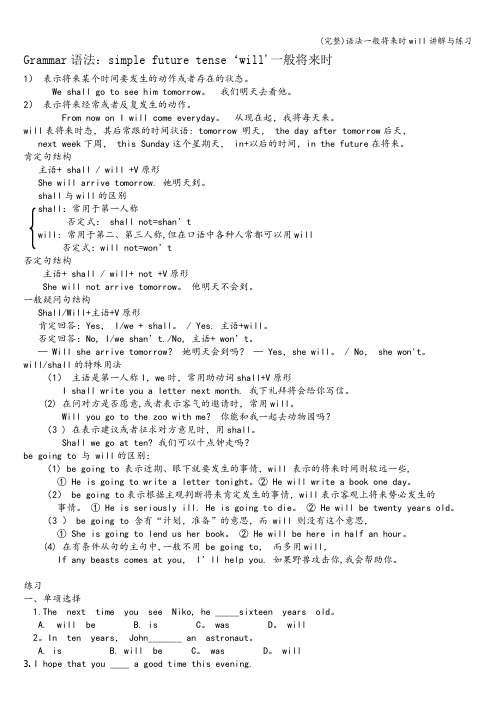
Grammar语法:simple future tense‘will'一般将来时1)表示将来某个时间要发生的动作或者存在的状态。
We shall go to see him tomorrow。
我们明天去看他。
2)表示将来经常或者反复发生的动作。
From now on I will come everyday。
从现在起,我将每天来。
will表将来时态,其后常跟的时间状语: tomorrow 明天, the day after tomorrow后天,next week下周, this Sunday这个星期天, in+以后的时间,in the future在将来。
肯定句结构主语+ shall / will +V原形She will arrive tomorrow. 她明天到。
shall与will的区别shall:常用于第一人称否定式:shall not=shan’twill: 常用于第二、第三人称,但在口语中各种人常都可以用will否定式:will not=won’t否定句结构主语+ shall / will+ not +V原形She will not arrive tomorrow。
他明天不会到。
一般疑问句结构Shall/Will+主语+V原形肯定回答:Yes, I/we + shall。
/ Yes. 主语+will。
否定回答:No, I/we shan’t./No, 主语+ won’t。
— Will she arrive tomorrow?她明天会到吗?— Yes,she will。
/ No, she won't。
will/shall的特殊用法(1)主语是第一人称I,we时,常用助动词shall+V原形I shall write you a letter next month. 我下礼拜将会给你写信。
(2) 在问对方是否愿意,或者表示客气的邀请时,常用will。
Will you go to the zoo with me?你能和我一起去动物园吗?(3 ) 在表示建议或者征求对方意见时,用shall。
初中一般将来时讲解练习及答案

一般将来时1.结构:谓语动词用“will + 动词原形”或“be (am / is / are) going to + 动词原形”We are going to have a meeting today.We will have a meeting today.I will go to school tomorrow.I am going to go to school tomorrow.He will leave our school next year.He is going to leave our school next year.一般将来时的标志:tomorrow, the day after tomorrow, next (week, year, month…)in 3 days, 2 days later, soon.1.用be going to do表示将来:主要意义,一是表示“意图”,即打算在最近的将来或将来实行某事。
Are you going to post that letter?How long is he going to stay here?I am going to book a ticket.另一意义是表示“预见”,即现在已有迹象表明将要发生或即将发生某种情况。
It’s going to rain.George is putting on weight; he is going to be quite fat.2.用will/ shall do表示将来:(注明shall主要用于第一人称I, we) 一是表示预见You will feel better after taking this medicine.Do you think it will rain?二是表示意图.I will not lend the book to you.Take it easy,I will not do it any longer.基本结构:She will come to have class tomorrow.Will she come to have class tomorrow?Sh e won’t come to have class tomorrow.What will she do tomorrow?肯定形式:①am/is/are going to + do;②will/shall + do.否定形式:①am/is/are going not to + do;②will/shall not + do.3. 用be doing表示将来:主要意义是表示按计划、安排即将发生的动作,常用于位置转移的动词。
初二英语一般将来时讲解及练习

初二英语一般将来时讲解及练习讲解一般将来时表示将来某个时间或某个动作或状态一定会发生或存在的情况。
在英语中,一般将来时的构成主要有两种形式:will/shall + 动词原形和be going to + 动词原形。
will/shall + 动词原形will/shall + 动词原形是一般将来时的最基本形式。
其中,will通常用于第一人称,shall通常用于第二和第三人称。
例如:I will go to the party tomorrow.(我明天去参加聚会。
)He will finish his homework after dinner.(他晚饭后完成他的作业。
)They will have a picnic in the park next weekend.(他们下周末在公园野餐。
)be going to + 动词原形be going to + 动词原形表示将要发生或存在的事情,通常用于未来的计划、意图或打算。
例如:I am going to study abroad next year.(我明年要去留学。
)She is going to visit her grandparents this weekend.(她这个周末要去看她的祖父母。
)We are going to have a meeting next week.(我们下周要开会。
)注意:在使用be going to + 动词原形时,要注意主语和be动词之间的一致性。
例如:He is going to play football.(他将要去踢足球。
)而不能说:He are going to play football.练习题一、用一般将来时填空I (visit) my grandparents next weekend.They (have) a party next Saturday.He (be) a doctor when he grows up.We (travel) to Europe next summer.She (write) a novel someday.They (move) to a new house next month.I (study) hard so I can get into a good college. He (play) the piano at the concert next week. We (have) a meeting tomorrow morning. She (graduate) from high school in two years.二、将下列句子变为一般将来时I study English every day. _She teaches math at the high school.They are going to the movies tonight.He likes to read books in his free time. ___ We have dinner at six o'clock every evening. _ The train arrives at 8:00 in the morning. __ She sings in the choir on Sundays.They play soccer after school. ___He works at a restaurant on weekends. ____ We visit our grandparents once a month. __ 三、用一般将来时完成下列对话A: What are you going to do this weekend? B: I'm going to visit my grandparents.A: That sounds nice. Where do they live?B: They live in the countryside.A: What are you going to do there?B: We're going to have a picnic and go fishing.A: That sounds like fun. Are you going with your parents?B: Yes, my parents and my younger brother are coming too.A: Have a great time!B: Thank you, we will!四、阅读理解My Future PlansMy name is Jack and I'm a sophomore in high school. I have a lot of plans for my future. First of all, I want to go to a good college and study business. I have always been interested in business and I think I would be good at it. After graduation, I plan to start my own business.I want to own a restaurant that serves healthy and delicious food.In order to achieve my goals, I need to work hard in school and get good grades. I also need to learn about managing money and running a business. I have been studying these topics on my own and I plan to take some courses in college.I know it won't be easy, but I'm determined to succeed. I believe that if I work hard and stay focused, I can achieve anything I want.What does Jack want to study in college?What does Jack plan to do after graduation?What kind of restaurant does Jack want to own?What does Jack need to do in order to achieve his goals?What does Jack believe?答案:Jack wants to study business in college.Jack plans to start his own business after graduation.Jack wants to own a restaurant that serves healthy and delicious food.Jack needs to work hard in school, get good grades, learn about managing money and running a business, and take courses in college.Jack believes that if he works hard and stays focused, he can achieve anything he wants.。
一般将来时讲解(附习题+答案)

一般将来时讲解(附习题+答案)一、一般将来时的含义:表示动作发生在将来二、一般将来时的句型:(1) will/shall+动词原形(2) be going to+动词原形三、一般将来时的时间状语:tomorrow(明天)、the day after tomorrow(后天)、next...(下一...): next week(下一周)、next year(明年)、next month(下个月)in+一段时间(...之后): in three days(三天之后)、in the future在未来this evening(今天晚上)四、一般将来时的句型结构:(1) will/shall+动词原形(will not =won’t)(will 各种人称均可用,shall 只能用于第一人称)1)肯定句:主语+will/shall+动词原型...如:I will go to school tomorrow.我明天将会去学校He will go to school tomorrow.他明天将会去学校。
2)否定句:主语+will/shall+not+动词原型...如:I won’t go to school tomorrow.我明天将不会去学校。
He won’t go to school tomorrow.他明天将不会去学校。
3)一般疑问句:Will/Shall +主语+动词原型...如:Will you go to school tomorrow?你明天要去学校吗?Will he go to school tomorrow?他明天要去学校吗?肯定回答:Yes, 主语+will.如:Yes, I will.Yes, he will.否定回答:No,主语+will+not.如:No, I won’t.No, he won’t.4) 特殊疑问句:特殊疑问词+will/shall+主语+动词原型...如:What will you do tomorrow?你明天将会做什么?What will he do tomorrow?他明天将会做什么?(2) be going to+动词原形1)肯定句:主语+be going to +动词原型...如:I am going to buy some books tomorrow.我明天打算去买一些书。
一般将来时be_going_to_与will的解析和练习知识讲解

否定句式:
There isn’t going to be a sports meeting at our school next week.
四、使用be going to 应注意的两点 1. there be句型中going to 后面的be不能改为have 例如:
特殊疑问句结构:
特殊疑问词+will +主语+动词原形+其他?
四、there be句型的一般将来时 1. There is/are going to be
如:There is going to be a sports meeting at our school next week.
一般疑问式:
Is there going to be a sports meeting at our school next week?
3. __Is__ Tom _g_o_i_n_g__to__p_la_y_ (play) football with us tomorrow?
4.There _a_r_e_g_o_i_n_g_t_o__b_e_ (be) strong winds tonight.
5.He _is__g_o_in_g__to__b_e_ (be)back in three hours.
2. There will be
(2).变一般疑问句 把will 提到句首,原句照抄结尾变问号。
They will have an English party next week. Will they have an English party next week?
Yes, they will. / No, they won’t.
2024年中考英语一般将来时详解以及练习
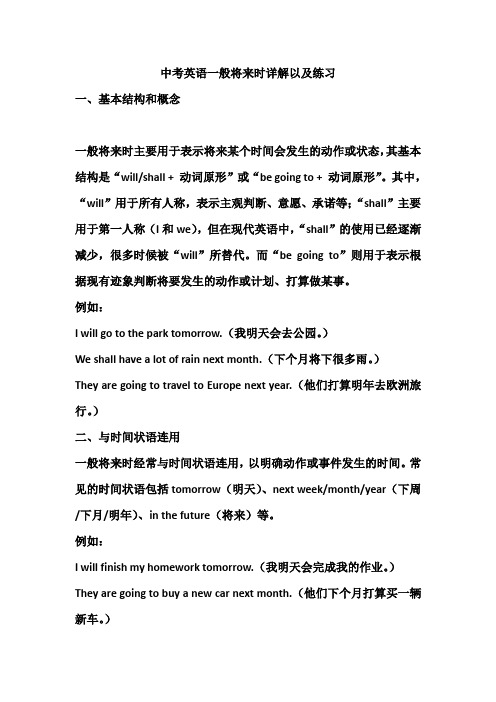
中考英语一般将来时详解以及练习一、基本结构和概念一般将来时主要用于表示将来某个时间会发生的动作或状态,其基本结构是“will/shall + 动词原形”或“be going to + 动词原形”。
其中,“will”用于所有人称,表示主观判断、意愿、承诺等;“shall”主要用于第一人称(I和we),但在现代英语中,“shall”的使用已经逐渐减少,很多时候被“will”所替代。
而“be going to”则用于表示根据现有迹象判断将要发生的动作或计划、打算做某事。
例如:I will go to the park tomorrow.(我明天会去公园。
)We shall have a lot of rain next month.(下个月将下很多雨。
)They are going to travel to Europe next year.(他们打算明年去欧洲旅行。
)二、与时间状语连用一般将来时经常与时间状语连用,以明确动作或事件发生的时间。
常见的时间状语包括tomorrow(明天)、next week/month/year(下周/下月/明年)、in the future(将来)等。
例如:I will finish my homework tomorrow.(我明天会完成我的作业。
)They are going to buy a new car next month.(他们下个月打算买一辆新车。
)三、表示打算、预测或推断除了表示单纯的将来事实外,一般将来时还可以用于表达打算、预测或推断。
这种用法常常与“will probably/maybe”等情态动词连用,以增加表达的准确性或不确定性。
例如:She will probably pass the exam.(她可能会通过考试。
)It will rain tomorrow, so we may stay at home.(明天会下雨,所以我们可能会待在家里。
(完整word版)一般将来时态讲解及练习和答案

1、概述一般将来时表示将来某个时间要发生的动作或存在的状态,常与表示将来的时间状语连用,如tomorrow,next week,next year等。
Why don’t you put the meat in the fridge? It will stay fresh for several days.为什么不把肉放在冰箱里?它可以保鲜好几天。
—You’ve left the light on。
你忘了关灯了。
- Oh , so I have。
I'll go and turn it off。
噢,那我马上去关.2、构成一般将来时由“助动词will/shall+动词原形”构成。
will用于第二、三人称,shall第一人称。
在口语中,will在名词或代词后常缩写为’ll,will not简缩为won’t[wount]。
但在美国英语中,各种人称皆可用will。
He will help his sister with her lessons。
他将帮助他妹妹做功课.We won’t be free this afternoon.今天下午我们没空。
3、一般将来时的用法(1)表示未来的动作或存在状态,常与表示将来的时间状语连用,如tomorrow, next Sunday, soon,in a month, in the future等。
We shall leave for London next Monday.我们将在下周一去伦敦。
He will come to see you the day after tomorrow.后天他要来看你。
You will be 20 next year。
明年你就二十了。
(2)表示将来反复发生的动作或习惯性动作We shall come and work in this factory every year.我们将每年来这工厂参加劳动。
The students will have five English classes per week this term.本学期学生每周将要上五节英语课。
语法一般将来时will讲解与练习

语法一般将来时will讲解与练习We are going to have a XXX.From now on。
I will exercise every day。
This means that I have made a XXX future.I will visit my parents next week。
This means that I have planned to visit them at a specific time in the future.She will not attend the party tonight。
This means that she has decided not to go to the party in the future.Will you help me with my homework。
This is a polite request for assistance in the future.XXX。
This is a n for a joint activity in the near future.XXX next month。
This means that I have XXX future.Will you please pass me the salt。
This is a polite request for an n to be taken in the present.I am going to buy a new car next week。
This means that I have made a XXX a car in the near future.XXX in two years。
This means that she is expected to graduate at a specific time in the future.A。
语法精讲will表示的一般将来时的用法
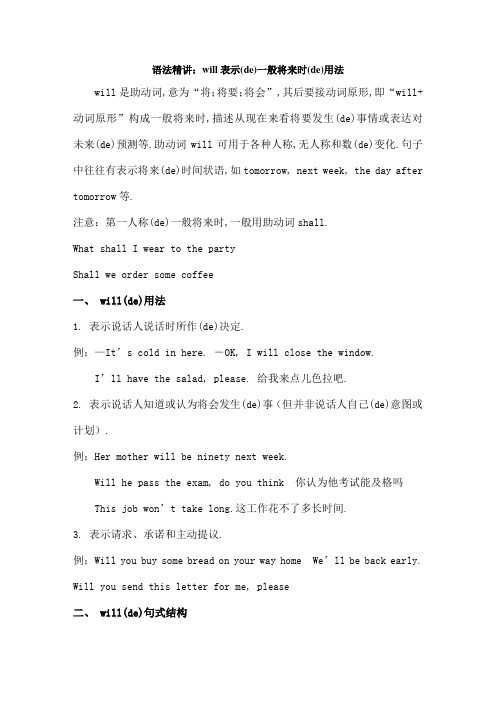
语法精讲:will表示(de)一般将来时(de)用法will是助动词,意为“将;将要;将会”,其后要接动词原形,即“will+动词原形”构成一般将来时,描述从现在来看将要发生(de)事情或表达对未来(de)预测等.助动词will可用于各种人称,无人称和数(de)变化.句子中往往有表示将来(de)时间状语,如tomorrow, next week, the day after tomorrow等.注意:第一人称(de)一般将来时,一般用助动词shall.What shall I wear to the partyShall we order some coffee一、 will(de)用法1. 表示说话人说话时所作(de)决定.例:—It’s cold in here. ―OK, I will close the window.I’ll have the salad, please. 给我来点儿色拉吧.2. 表示说话人知道或认为将会发生(de)事(但并非说话人自己(de)意图或计划).例:Her mother will be ninety next week.Will he pass the exam, do you think 你认为他考试能及格吗This job won’t take long.这工作花不了多长时间.3. 表示请求、承诺和主动提议.例:Will you buy some bread on your way home We’ll be back early. Will you send this letter for me, please二、 will(de)句式结构1. 肯定句结构:主语+will+动词原形+其他.I will arrive in Shanghai tomorrow. She will go there next week.2. 否定句结构:主语+will+not+动词原形+其他.由于will是助动词,因此否定句直接在will后加not即可.Will not可缩略为won’t,即will not=won’t.I won’t be able to come to dinner today. We won’t be busy thisevening.3. 一般疑问句结构:Will+主语+动词原形+其他will为助动词,变一般疑问句时,直接提到句首.She will be our English teacher next term.一般疑问句: Will she be your English teacher next term I will be a middle school student next year.一般疑问句:Will you be a middle school student next year4. 特殊疑问句结构:疑问词(组)+will+主语+动词原形+其他What will the future be like How will you finish your workI will arrive in Shanghai next week. (对划线部分提问)对Shanghai提问: Where will you arrive in next week对next week提问: When will you arrive in Shanghai课后练习:中考链接:1.—Which team do you think ________ the game—Hard to say. There are still ten minutes before it ends.A.wonB. has wonC. will winD. wins2. This term _______over. The summer vacation is coming in two weeks.A. isB. wasC. has beenD. will be 巩固练习用括号内(de)时间状语改写句子.1. I visit my grandparents.(next weekend)______________________________________________2. Does she speak English at the meeting (tomorrow)______________________________________________。
- 1、下载文档前请自行甄别文档内容的完整性,平台不提供额外的编辑、内容补充、找答案等附加服务。
- 2、"仅部分预览"的文档,不可在线预览部分如存在完整性等问题,可反馈申请退款(可完整预览的文档不适用该条件!)。
- 3、如文档侵犯您的权益,请联系客服反馈,我们会尽快为您处理(人工客服工作时间:9:00-18:30)。
Grammar语法:simple future tense‘will’一般将来时
1) 表示将来某个时间要发生的动作或者存在的状态。
We shall go to see him tomorrow. 我们明天去看他。
2) 表示将来经常或者反复发生的动作。
From now on I will come everyday. 从现在起,我将每天来。
will表将来时态,其后常跟的时间状语:tomorrow 明天, the day after tomorrow后天, next week下周, this Sunday这个星期天, in+以后的时间,in the future在将来。
肯定句结构
主语+ shall / will +V原形
She will arrive tomorrow. 她明天到。
shall与will的区别
shall:常用于第一人称
否定式: shall not=shan’t
will: 常用于第二、第三人称,但在口语中各种人常都可以用will
否定式:will not=won’t
否定句结构
主语+ shall / will+ not +V原形
She will not arrive tomorrow. 他明天不会到。
一般疑问句结构
Shall/Will+主语+V原形
肯定回答:Yes, I/we + shall. / Yes. 主语+will.
否定回答:No, I/we shan’t./No, 主语+ won’t.
—Will she arrive tomorrow? 她明天会到吗?—Yes,she will. / No, she wo n’t.
will/shall的特殊用法
(1) 主语是第一人称I,we时,常用助动词shall+V原形
I shall write you a letter next month. 我下礼拜将会给你写信。
(2) 在问对方是否愿意,或者表示客气的邀请时,常用will.
Will you go to the zoo with me? 你能和我一起去动物园吗?
(3 ) 在表示建议或者征求对方意见时,用shall.
Shall we go at ten? 我们可以十点钟走吗?
be going to 与will的区别:
(1) be going to 表示近期、眼下就要发生的事情,will 表示的将来时间则较远一些,
①He is going to write a letter tonight.②He will write a book one day.
(2) be going to表示根据主观判断将来肯定发生的事情,will表示客观上将来势必发生的
事情。
①He is seriously ill. He is going to die. ②He will be twenty years old.
(3 ) be going to 含有“计划,准备”的意思,而will 则没有这个意思,
①She is going to lend us her book. ②He will be here in half an hour.
(4) 在有条件从句的主句中,一般不用be going to, 而多用will,
If any beasts comes at you, I'll help you. 如果野兽攻击你,我会帮助你。
练习
一、单项选择
1.The next time you see Niko, he _____sixteen years old.
A. will be
B. is
C. was
D. will
2.In ten years, John_______ an astronaut.
A. is
B. will be
C. was
D. will
3.I hope that you ____ a good time this evening.
A. have
B. are having
C. will have
D. has
4.Look at those big black clouds. It ____ rain. Let’s hurry.
A. must
B. will
C. would
D. is going to
5.There ____ a basketball match this afternoon.
A. will have
B. will be
C. has
D. have
6.We ____ to the park if it is fine tomorrow.
A. will go
B. go
C. goes
D. to go
7.There _____ a kite show in the zoo tomorrow.
A. was
B. is going to have
C. will have
D. is going to be
8. Mother ______ me a nice present(礼物) on my next birthday.
A. will gives
B. will give
C. gives
D. give
二、用一般将来时填空。
(借助will)
1. I _________ (visit) my uncle tomorrow.
2. There _______ (be) a football match in our school next week.
3. He __________ (help) you with your English this evening.
4. We _________ (have) a meeting tomorrow.
三、按要求完成下列句子。
1. I will go to school by bike.(改为一般疑问句)
________________________________________?
2.He will check his e-mails this afternoon.(改为否定句)
__________________________________________.
3.Li Ming and his friends will have a piano lesson. (改为一般疑问句并作肯定和否定回答)
__________________________________________? __________. ___________.
4.There will be some robots in our homes. (改为否定句)
There _____ _____ _____ _____ robots in our homes.
5.Everyone will have a small car. (对划线部分提问)
__________everyone _____?
四、用所给词的适当形式填空
1.______ (be) you free tomorrow?
2.What _____ you _______________ (do) tomorrow morning?
3.Hurry up! Or we _____ (be) late.。
